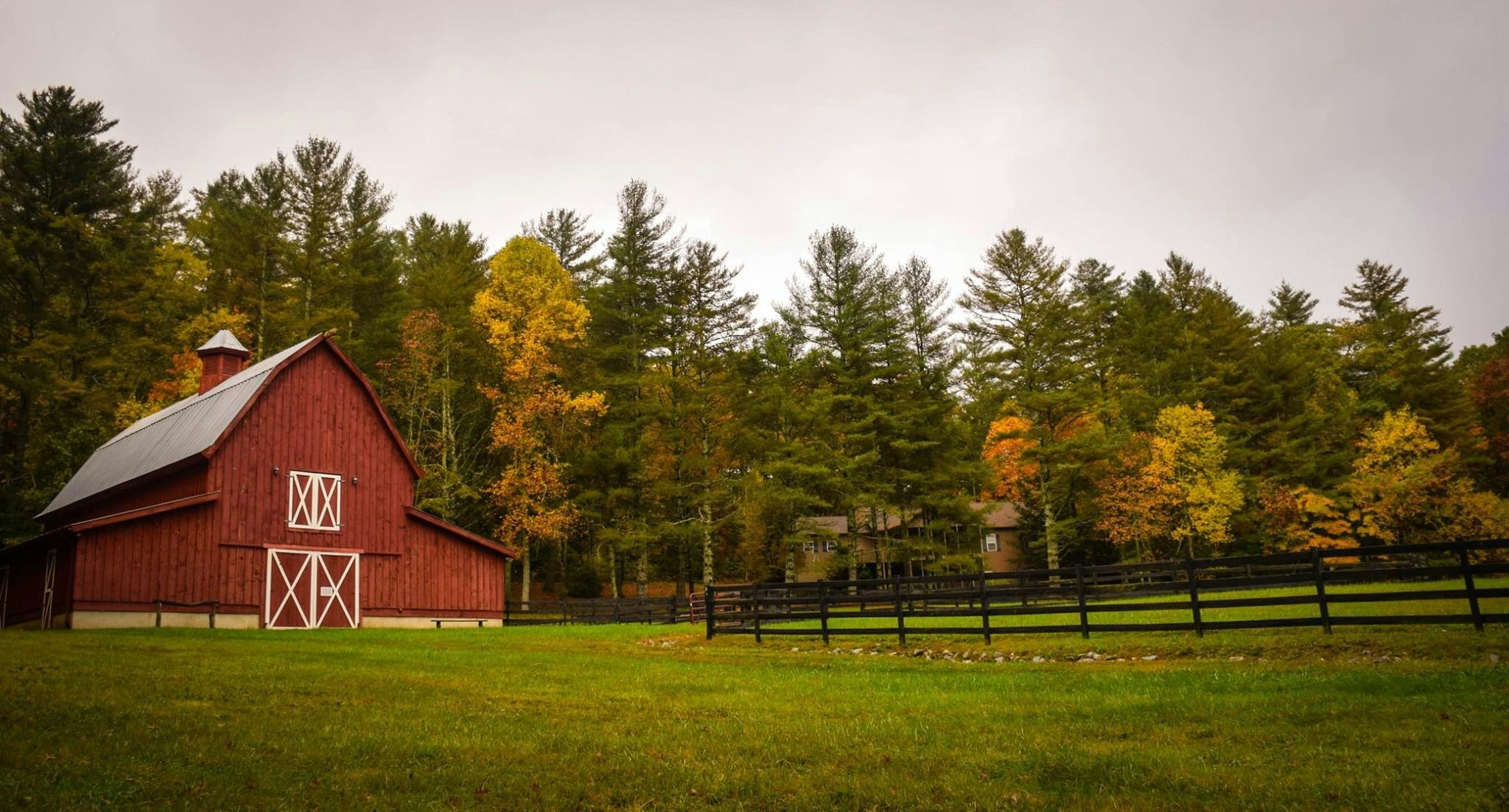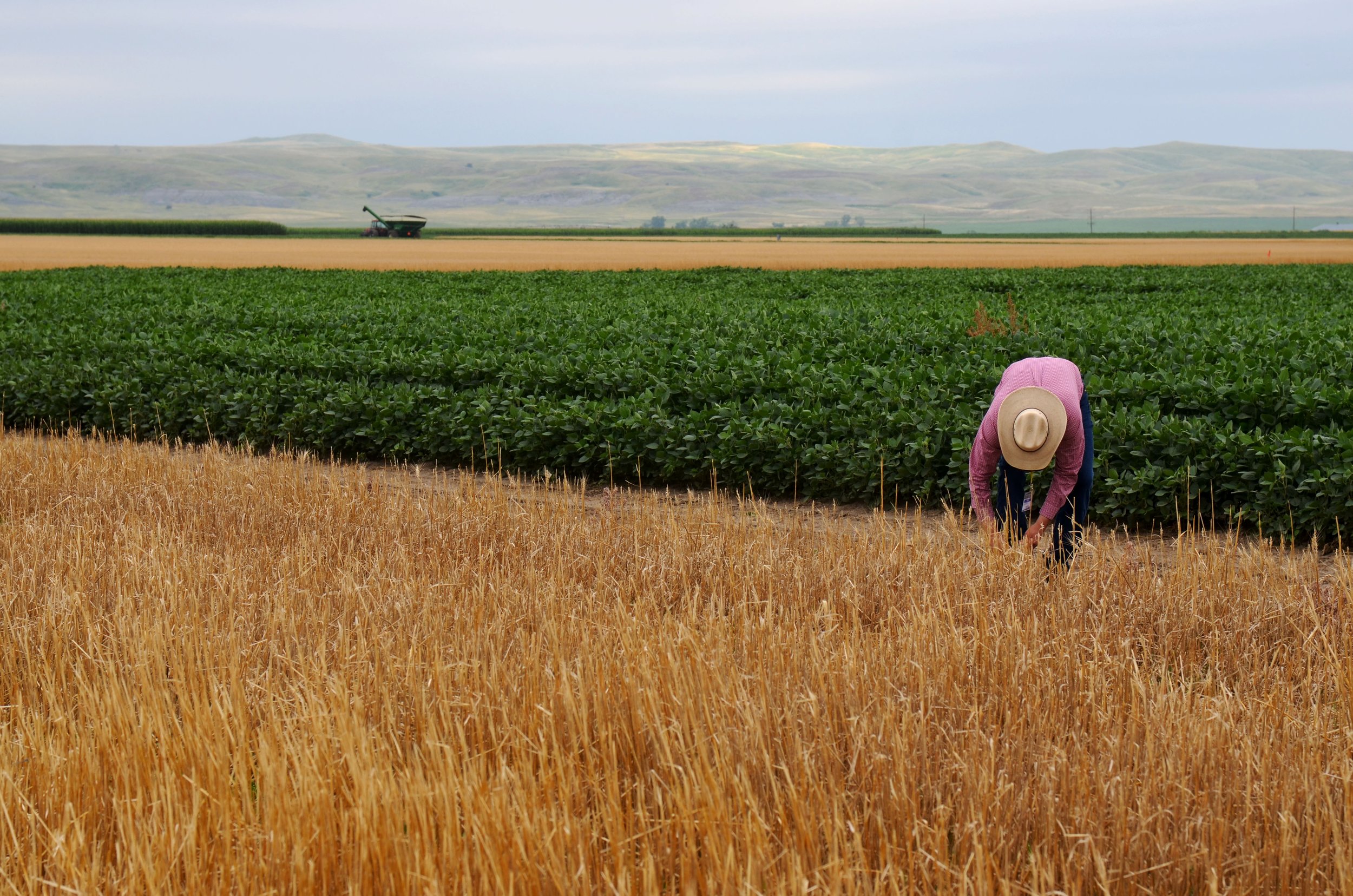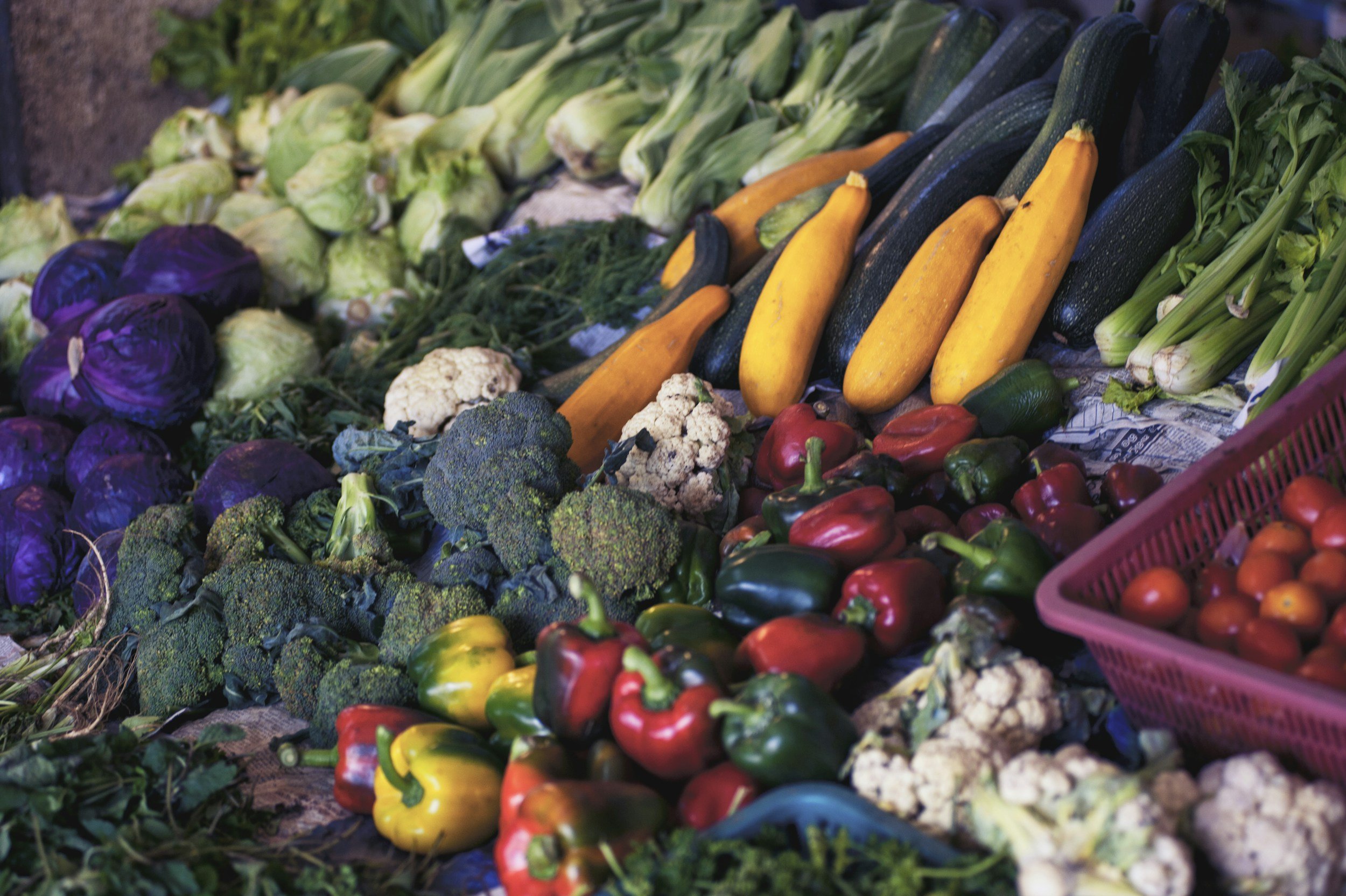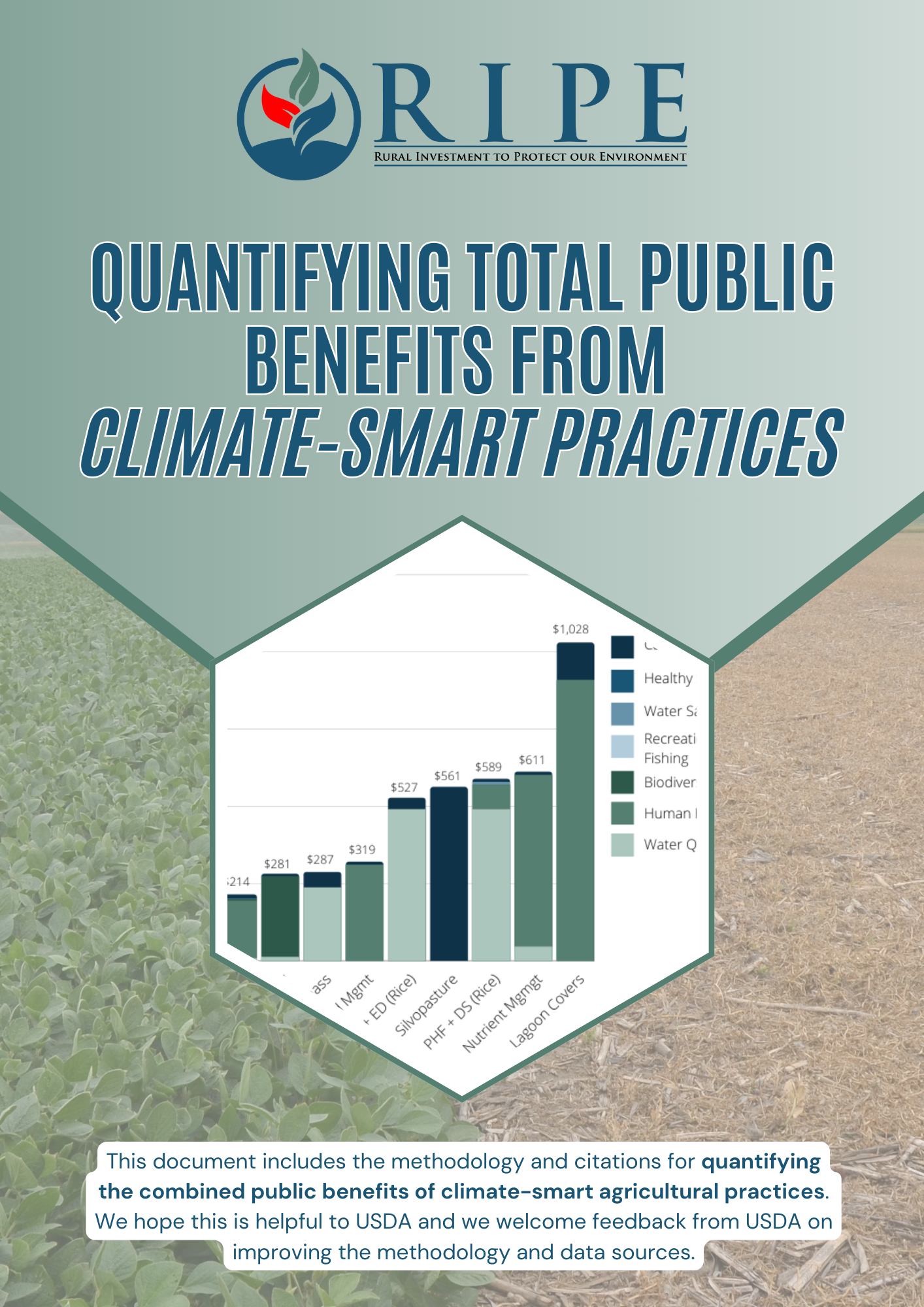
Helping Producers &
Helping the Planet
Farmers and ranchers hold the keys to the future as they bear the responsibility of feeding the growing population. They shouldn't have to bear this responsibility alone.
Our Approach
We are proud of our diverse coalition, whose members represent various geographic locations, farm size, and commodity types. In addition to our commitment to DEI, we are also committed to a bipartisan approach to increase the adoption of regenerative agriculture and renewable energy in rural America.
Scaling regenerative agriculture and renewable energy The RIPE Way means prioritizing bipartisanship and belonging across all demographics.
RIPE Principles to Scale Voluntary Conservation Adoption
De-risk voluntary conservation adoption. This requires incentives that include the full cost of adoption, cost of management, economic losses during the transition to new practices, and increasing production costs.
Conservation programs must be simplified and streamlined. This includes the enrollment process that enables all producers, including early adopters and/or historically underserved, to participate.
Prioritize investments in agricultural conservation practices that provide the greatest economic and environmental benefits to maximize the public’s return on investment. This should include the value of stacked ecosystems benefits accrued through improved soil health, greenhouse gas reduction, water quality and conservation, wildlife habitat, and outdoor recreation.

Our collective future depends on ecologically sound agricultural practices. Enhancing above and below ground diversity is the key to the restoration of resilient, profitable, environmentally friendly farming.
Rhonda Daly, Co-founder YLAD Living Soils NSW
RESOURCES
RESOURCES
Fill out the form below to access RIPE’s Resources, including our latest white paper “From Soil to Stream: Regenerative Agriculture and Water.”

Regenerative agriculture practices provide several benefits to the environment and to public health, and we believe farmers and ranchers should be compensated for these benefits.

Regenerative agriculture can pave the way for more nutrient-dense food, allowing us to sustain our natural resources while feeding our growing population healthy food.

RIPE supports expanding clean energy opportunities for farmers and mitigating the tension sometimes created by installing it on productive agricultural lands.

Regenerative agriculture can protect and preserve precious natural resources, including water. RIPE supports compensation for producers for the ecosystem services created by their conservation practices.
✺ Frequently Asked Questions ✺
-
RIPE proposes paying farmers a fair value for adopting and maintaining key conservation practices. This includes the costs of practice adoption, maintenance of the practice over the long term, and protection against yield loss in earlier years of transition. This is justified by the stacked ecosystem service value of voluntary stewardship practices that RIPE supports including GHG emission reductions, carbon sequestration, water quality, air quality, biodiversity and other ecosystem services they provide.
-
RIPE proposes paying for costs of implementation, practice maintenance, economic losses during transition to new practices and increased input costs combined.
All RIPE-approved practices will deliver public benefits — including soil health, clean water, water conservation, wildlife conservation and climate mitigation — that exceed payment value.
-
RIPE intends for its work and policies to benefit all farmers, in all geographies, growing all commodities at all scales, but will likely be limited by funding. The RIPE approach is scalable to any level of public funding made available and would be further supported by private markets. In order to be fiscally responsible, RIPE efforts will prioritize adoption of the most beneficial practices first and made available to as many producers as possible on a per acre basis. As funding increases, more practices and acres would become eligible for participation.
-
RIPE’s approach to scaling regenerative agriculture would help farmers manage climate change and inform climate change policy that works for farmers and ranchers managing the land. First, it would fully and fairly compensate farmers for investing in voluntary farm stewardship practices that help them adapt to flooding, droughts and other extreme weather patterns that are part of a changing climate. Practices such as cover crops and water conservation would be fully compensated. Second, U.S. farmers will be empowered to influence climate policy, ensuring that fuel, fertilizer and other inputs will be kept in check.
-
We welcome your involvement!
Make use of our Volunteer Toolkit
Follow RIPE on Facebook, Twitter, LinkedIn and YouTube and join the conversations
Connect with the RIPE Outreach Team by contacting GetInvolved@RIPEroadmap.org
Join the Farmer Advisory Network
-
RIPE is focused on delivering a program that fairly rewards producers for the public benefits they provide and at rates that surpass climate policy costs. With this in mind, the RIPE approach would scale to work with any range of funds Congress chooses to invest and leverage private markets to further bolster practice adoption.
A key RIPE principle is not to compete for current funding from existing program buckets. Instead, we see the Farm Bill as a great option to insert a small program to demonstrate proof of concept while ultimately using other vehicles to invest in the full program.
-
The cost of a climate policy on agricultural inputs plus the cost of adopting stewardship practices will total around $67 per acre for many producers. Carbon farming payments will only deliver around $17 per acre to producers (at a carbon price of $50 per ton), leaving them with a net loss. However, farmers and ranchers who adopt stewardship practices deliver public benefits around $100-$300 per acre when stacking the ecosystem services such as soil health, climate, water quality, biodiversity, and more.
RIPE advocates for allowing producers to earn the stacked ecosystem service value of their voluntary practices, delivering value to the public and the grower.
Across the biggest U.S. commodities, the average cost of a climate policy would be $52 per acre. Looking across the spectrum of carbon farming practices, the average value is around $48 per acre, leaving most growers with a net loss. But that includes practices that most producers would likely not implement, such as biochar. If we only include practices that are popular with producers, then the average per-acre payment drops to $12. For most farmers and ranchers, the math of carbon farming payments alone simply doesn’t work.
-
RIPE’s approach does not conflict with private markets but rather depends on leveraging private markets to further scale key conservation practice adoption. RIPE insists that farmers retain their environmental assets and are allowed to sell them to private market interests. RIPE builds on the work of the private market by:
Encouraging a guaranteed price
Reducing intrusive farm-level monitoring
Creating pathways for early actors to participate
-
Yes. RIPE’s approach is designed to allow all farmers and ranchers to participate, including those who use Bureau of Land Management (BLM) lands for grazing.
BLM requires renters to specify their practices in the lease, so ranchers must check their lease to ensure the allowance of new practices they would like to adopt. RIPE’s approach includes practices that have been approved by BLM in ranching leases, when requested, such as: cover crops on grazing lands, riparian forest buffers, filter strips, livestock forage and biomass planting, riparian herbaceous cover, nutrient management plans (state or national protocols), and maintaining native grasslands. If the lease does not include these or similar practices, ranchers can integrate them when renegotiating their lease with BLM, thus enabling participation in RIPE’s program.
Additionally, RIPE supports partnering with ranchers and ranching associations to engage BLM in amending its regulations to allow ranchers to add conservation practices prior to their lease renewals, based on the precedent that BLM encourages permit holders to be stewards of the land they rent.
-
Yes. RIPE’s approach includes farm practices that mitigate flooding and would compensate farmers fairly for their implementation.
Flood mitigation practices compensated by RIPE’s plan include cover crops, reduced tillage, rotational grazing, silvopasture and riparian buffers. These practices:
Increase water infiltration into the soil rather than allowing the water to run across the land, reducing flood depth and duration on frequently flooded lands, especially in alluvial river valleys and areas with hydric clay soils.
Hold soil in place during flooding. This prevents sedimentation in waterways and overland flow, and it reduces the amount of standing water on fields and pastures.
Reduce polluted waterways caused by flooding. Pesticides and fertilizers, carried as runoff, damage fishing and recreation, as well as aquatic and terrestrial biodiversity.








